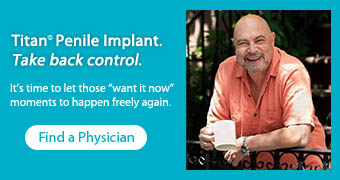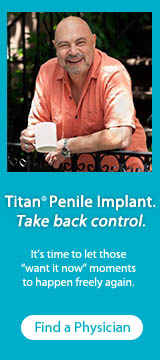Study Synopsis and Perspective
Tadalafil (Cialis) seemed to be the most effective phosphodiesterase type 5 inhibitor for treating erectile dysfunction (ED) in a new meta-analysis.
Dr. JinLing Tang of The Chinese University of Hong Kong and colleagues pooled data on phosphodiesterase type 5 (PDE5) inhibitors from 118 trials involving almost 32,000 patients.
Both meta-analysis and network meta-analysis provided similar results, they report. Overall, the agents surpassed placebo in treating ED.
There were no major differences in safety profiles among the various drugs the authors studied, they reported online February 7 in European Urology.
Avanafil (Stendra) was less effective on Global Assessment Questionnaire question 1 than both tadalafil (relative risk 0.61) and vardenafil (Levitra); RR 0.63).
As measured by the erectile function domain of the International Index of Erectile Function, tadalafil was more effective than vardenafil and udenafil (Zydena).
For all efficacy outcomes, the absolute effects and the rank tests indicated that tadalafil and vardenafil were the most effective agents. Drug dosage, say the investigators "is a potential determinant of treatment effect and may affect the conclusions of the comparisons between different drugs."
However, after adjusting for dosages, the results remained the same.
More research is needed because of the limitations of current data, but the researchers conclude that "because tadalafil also has many other advantages, such as patient preference, it may be considered the first choice for ED patients."
Commenting on the findings, Dr. Roger Dmochowski of Vanderbilt University, Nashville, Tennessee told Reuters Health by email, "As a class, the PDE5 inhibitors constitute the primary oral therapy for erectile dysfunction. These agents now have a significant amount of high quality evidence supporting their efficacy and tolerability."
But, he added, cross comparisons of different studies and populations – and their outcomes – "should be viewed with a high degree of circumspection."
"Statements as to superiority cannot be made outside of direct head to head comparator trials using similar study schema," Dr. Dmochowski cautioned.
Dr. Alan D. Seftel of University Medical Center, Camden, New Jersey, also has reservations. He told Reuters Health by email, "While it is tempting to accept the authors' conclusions regarding tadalafil and vardenafil, enthusiasm should be tempered by a variety of factors. The methodology by which the authors selected the papers for the study pool is a bit elusive; the true clinical meaning of the small positive differences in the absolute changes in (various) scores seen with tadalafil and vardenafil is not entirely clear; many of the sildenafil studies preceded the vardenafil and tadalafil studies making comparisons amongst the PDE5-inhibitors challenging."
Nevertheless, Dr. Seftel continued, "The authors are to be congratulated for their efforts to summarize the currently available PDE5-inhibitor literature. Several of their findings are quite reassuring and importantly, mirror clinical practice. All PDE5-inhibitors appear to be efficacious, safe and effective for the treatment of male ED. Side effects are mild and well-tolerated, and there appears to be no significant differences in safety profiles amongst the different PDE5-inhibitors.
Patients and physicians should interpret comments about tadalafil with "cautious optimism," he said.
"These authors provide an excellent synopsis of the state of the art of the numerous PDE5-inhibitors for the treatment of male ED, with several extremely positive findings," Dr. Seftel said. "As a class, PDE5-inhibitors continue to demonstrate robust efficacy and safety profiles, providing further support for PDE5-inhibitors being ideal candidates for first-line therapy for the treatment of male ED."
Drs. Dmochowski and Seftel were not involved in the research. Dr. Tang did not respond to requests for comments.
The study was funded by the Health and Medical Research Fund from the Food and Health Bureau of Hong Kong. The authors have disclosed no relevant financial relationships
new study test for PDE5s
Return to “General Discussion”
Who is online
Users browsing this forum: No registered users and 60 guests






